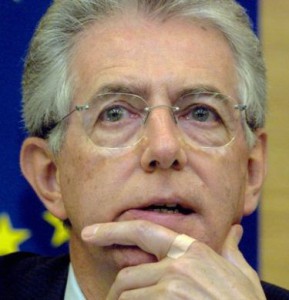 MADRID | Mario Monti explained in an interview to the daily newspaper El Mundo that the Spanish labour reform ‘goes in the direction’ of the one he wishes to implement in his country. The Italian prime minister also comments on the reforms his government has carried out in Italy, such as the pension reform and he praises the Italian people’s ‘mature attitude’ when
MADRID | Mario Monti explained in an interview to the daily newspaper El Mundo that the Spanish labour reform ‘goes in the direction’ of the one he wishes to implement in his country. The Italian prime minister also comments on the reforms his government has carried out in Italy, such as the pension reform and he praises the Italian people’s ‘mature attitude’ when
“it came time to accepting the sacrifices that are required of them”.
The ex European commissioner, who meets Thursday with the Spanish president Mariano Rajoy in Rome, does not believe that there exists a contradiction between greater labour flexibility and the stability of the workers’ contractual relation and he poses as an example what takes place in countries in the north of Europe.
“What doesn’t work is a group of employee who are on the inside, very well protected, and others on the outside who are completely unprotected,” says Monti, who goes on to say that “making the labour market more flexible does not mean turning it into a jungle.”
Monti attributed Italians’ understanding of his reforms to the fact that the harsh measures did not focused on only a part of the population but rather that it was widespread.
“Fairness is a principle that must always be kept in mind” says Monti, who explains that the “the reform of the pensions was accompanied by an increase in the fiscal pressures on luxury goods, that before were not taxed or were barely taxed, and a tax on capital that was outside of Italy.”
In this regard, the Italian prime minister expressed that
“the only way the unions would accept the reform of the pension system was if the rich and the upper class also paid.”
Monti also explained that during the period the British prime minister Margaret Thatcher and the US president Ronald Reagan were in power, great inequalities were created and now, to fight against them it is necessary to make the “markets more functional”, something he believes that the reforms in Italy and in Spain shall achieve.
Monti in the interview speaks about the future of the European welfare state and he says there exists a “real risk” that it disappears as we have known it, and he considers that the only solution for that welfare system to be viable is that Europe be competitive.
With regards to the Greek crisis, he feels that “now there exist all the necessary conditions so that Greece may return to an adequate path” and he adds that, although it has cost the citizens of that country a great deal, “much greater evils have been avoided”.
As far as the role of Europe is concerned in the current economic situation, Monti says that
“Europe was not constructed to handle crisis situations” and he recognises that “it reacted too late”, even though he believes the EU “has learned a lesson so as to organise itself better for the future”.
Monti also admits that
“the crisis makes it increasingly difficult to conciliate a greater European integration with democracy” and he poses as an example the fact that the government budgets of the member countries are examined by Brussels before they arrive to the national parliaments, something which, although he considers it necessary, he also recognises could create a feeling of “a lessening of national democracy.”
With respect to the need of a greater flexibility in the objectives imposed by the EU to the member countries, Monti does not believe it is necessary to be more flexible in meeting them, although he does consider that they should be accompanied by growth measures.





Be the first to comment on "Italian prime minister praises Spanish labour reform"